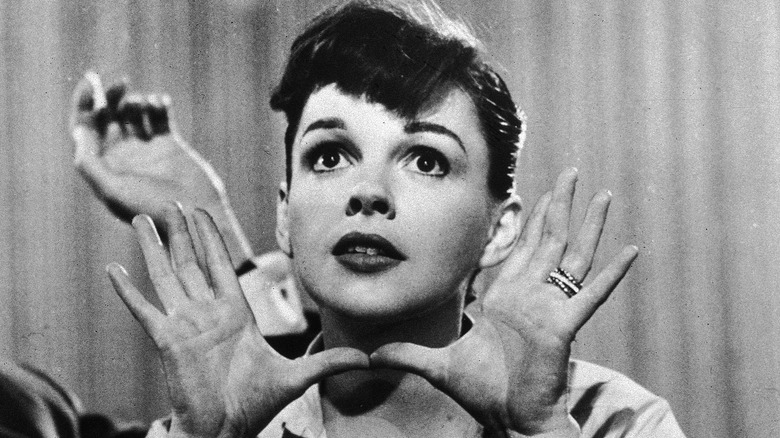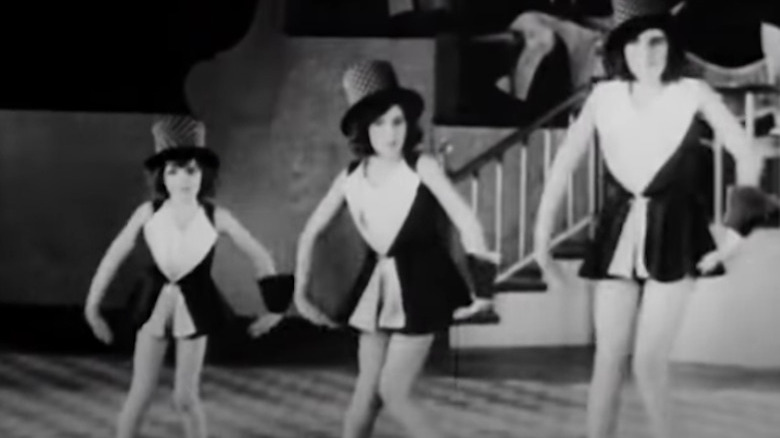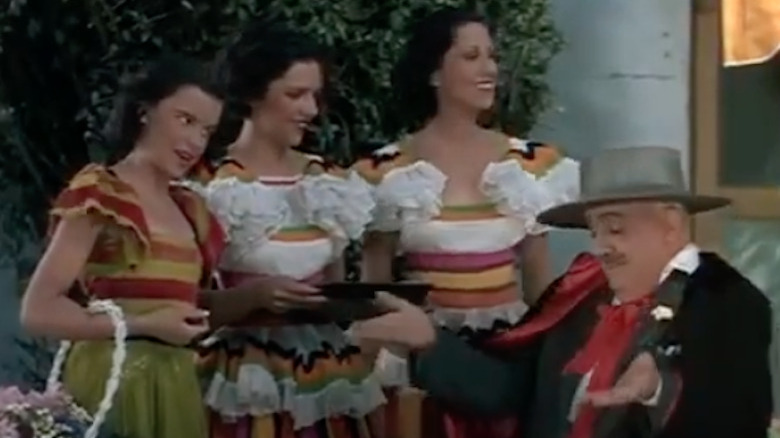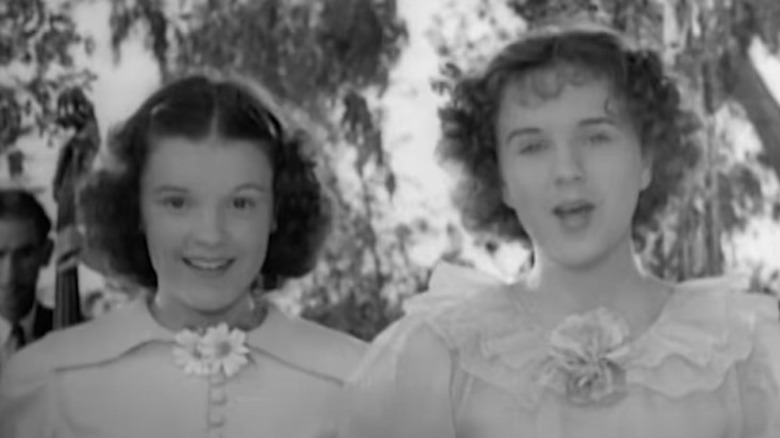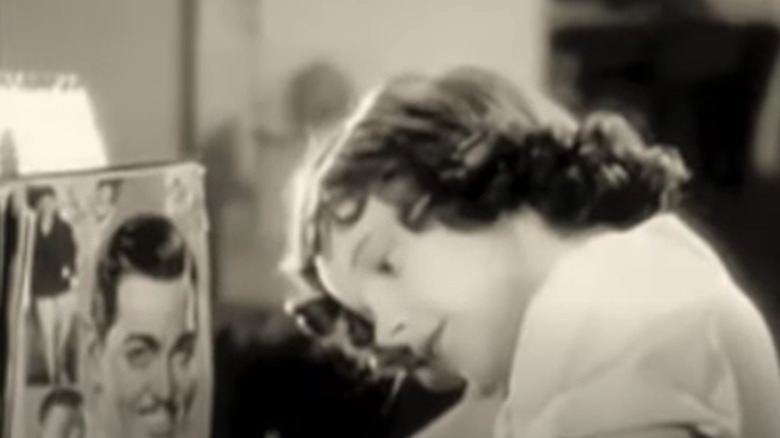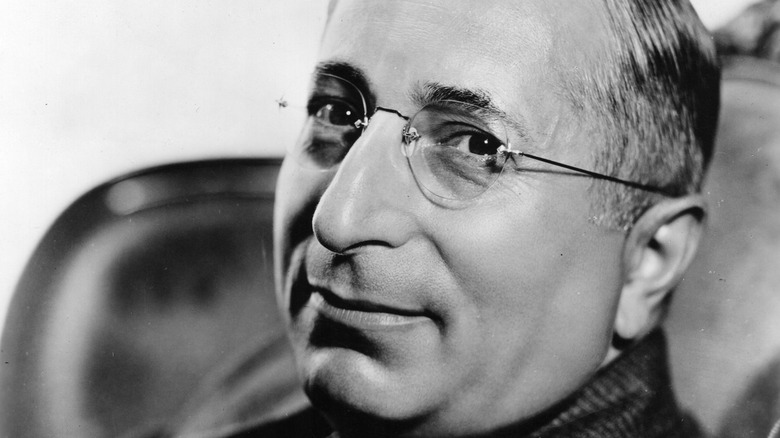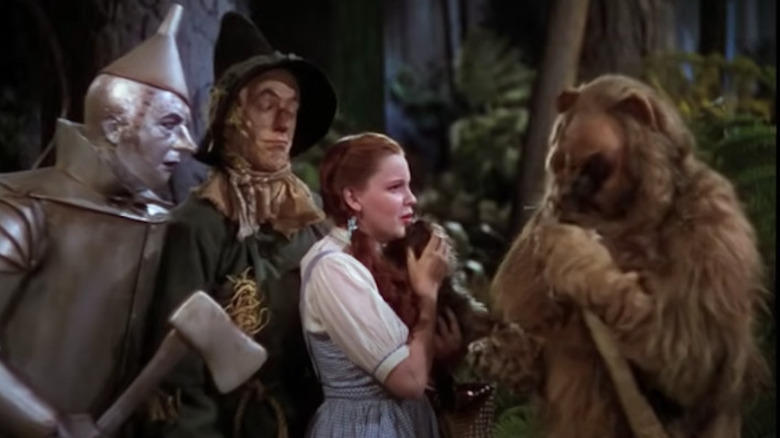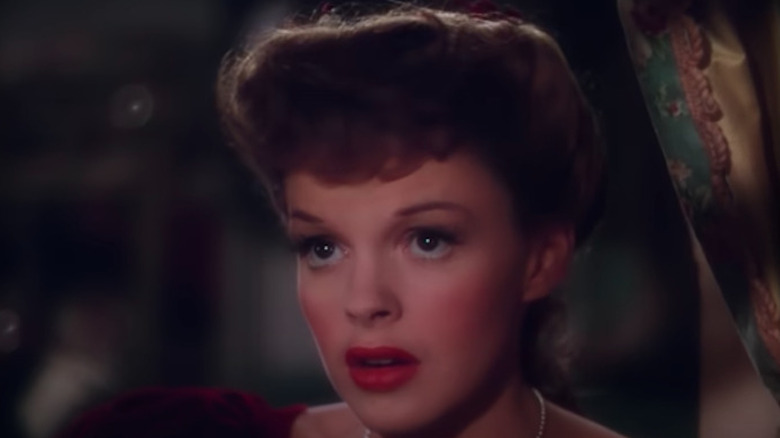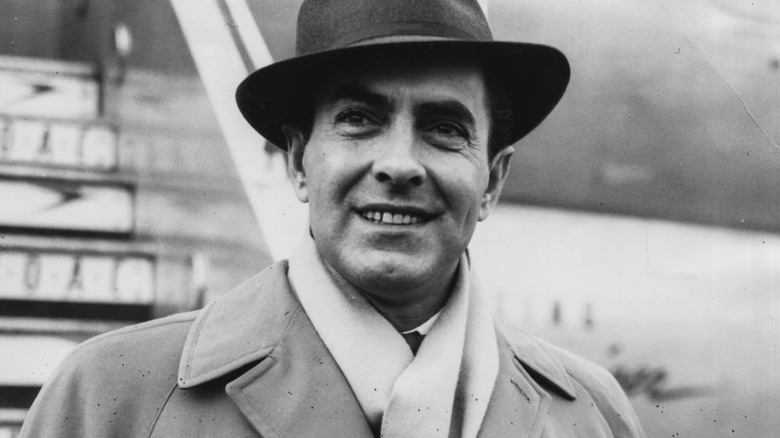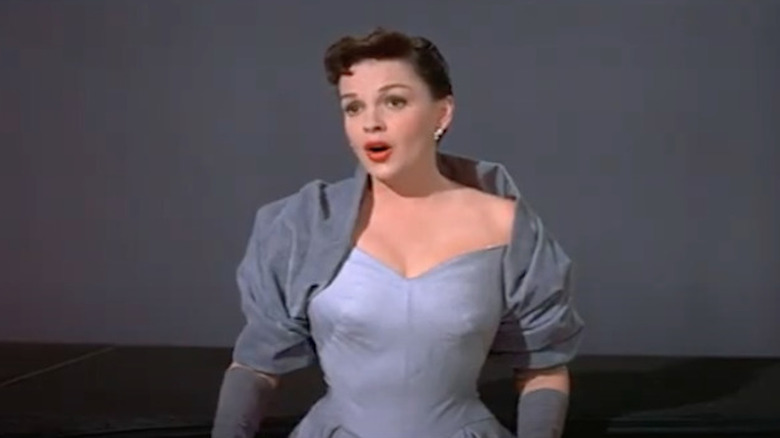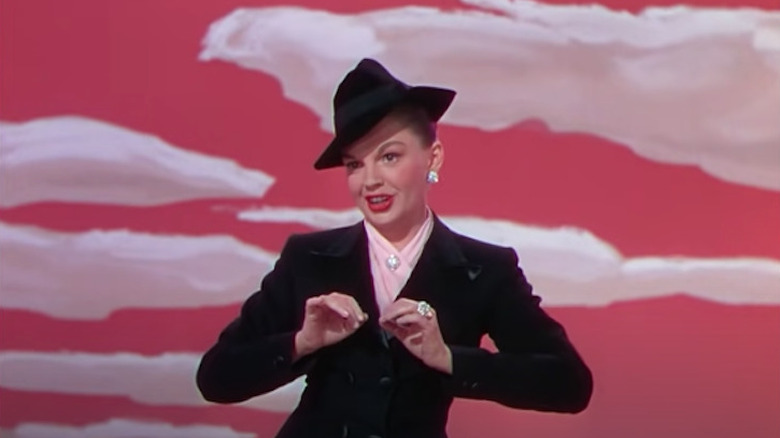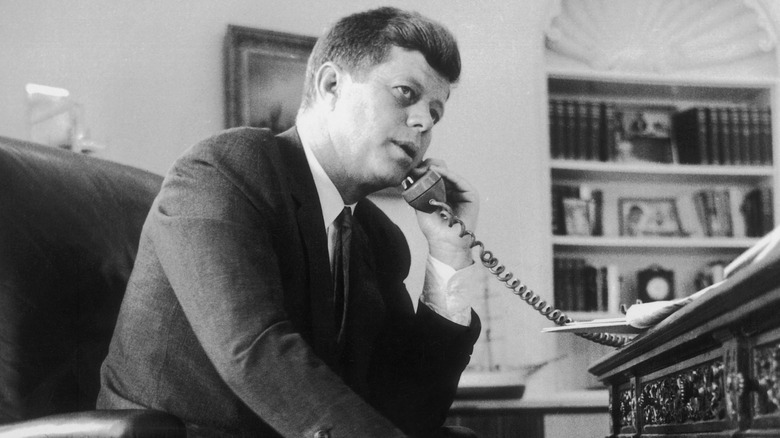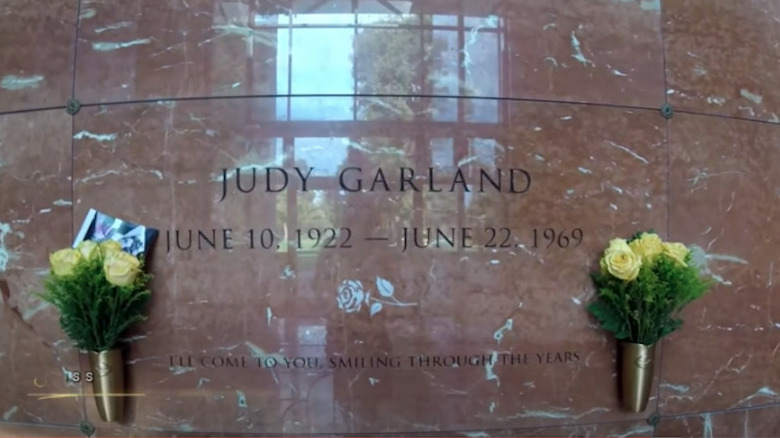What Fans Might Not Know About Judy Garland
Perhaps one of Hollywood's greatest entertainers, boasting an enviable career and more than one iconic performance, Judy Garland passed away when she was only 47 years old. Her life is often considered a tragedy and was recently portrayed as such in the 2019 biopic "Judy." Originally named Francis "Baby" Gumm, Garland was born in 1922 to two vaudeville actors. Her parents didn't have a happy marriage, though — her father was gay and often had affairs with other men — and Garland's mother, Ethel, tried to abort her pregnancy, according to Biography. Nevertheless, her parents were eager to push "Baby" and her sisters into the limelight, and Garland wasn't even alive for three years when she started show business. "As I look back on it, the first four years of my life were the happiest I ever had," Garland once said, per PBS.
Hardcore Judy Garland fans are well-versed in the hardships and abuse she had to endure in order to conform to the Hollywood star-illusion, but her legacy is extensive and far-reaching. She's considered a gay icon, inspiring the phrase, "Are you a friend of Dorothy?" which is code for "Are you gay?" (per PBS). She was also the first woman to receive the Grammy for album of the year in 1961 (per USA Today) and was the youngest ever to receive the Cecil B. deMille lifetime achievement award, according to the Golden Globes.
Here's a look at some lesser-known facts about the Hollywood legend.
Jingle Bells was her first solo
When she was only 2 years old, Judy Garland made her solo debut and belted out "Jingle Bells" at her father's New Grand Theater in Grand Rapids, Minnesota, per Britannica and the Judy Garland Museum. "Baby" Gumm stood on stage the day after Christmas in 1924 in a white dress made by her mother, who played the piano in the pit. Her performance charmed the audience who applauded graciously. "Baby" was thrilled by the response. She proceeded to sing the song five times until her father had to carry her off stage, according to "Judy Garland: World's Greatest Entertainer."
Ethel would parade her daughters around numerous vaudeville shows to bolster their young careers, including at the famous nightclub The Cocoanut Grove and Chicago's 1934 World Fair. She started giving Garland pills before she turned 10 years old — both pills for energy and sleeping pills to calm her down. Garland would later call her mother "the real Wicked Witch of the West" and described the stage as the only place she "felt wanted." During a 1967 interview with Barbara Walters, Garland recalled how, whenever she was reluctant to perform onstage, her mother threatened to "wrap [her] around the bedpost and break [her] off short," per Biography.
Judy named herself after a song
Judy Garland and her sisters formed a popular vaudeville act, calling themselves the "the Gumm Sisters." The name didn't lend itself well to marquee lights, though, especially as it was once jokingly referenced as "The Glumm Sisters" during a 1934 show at Detroit's Oriental Theatre, according to WBEZ Chicago. The emcee, comedian George Jessel, advised the family to choose something more aesthetically fitting and recommended "the Garland Sisters," in reference to drama critic Robert Garland, per "Judy Garland: World's Greatest Entertainer."
Around this time, Hoagy Carmichael, who was one of the most popular composers during the 1930s and the 1940s, rolled out the jazzy hit "Judy," according to Second Hand Songs. The song contained lyrics like: "If her voice can bring / Every hope of the spring / That's Judy," according to Lyrics.com. A few months after changing her last name, Garland changed her first name from Frances to Judy, inspired by Carmichael's hit song. She was signed by MGM shortly after, according to The Judy Garland Museum.
She had an early rival
Deanna Durbin and Judy Garland were both stars on the rise when they were cast in the short film "Every Sunday." In those days, actors were placed in "short subject" films so that studios could gauge their popularity with the public without having to invest in them prematurely, according to The Guardian.
It was the start of Garland's career — she was only 14 years old — and she was anxious to find work with MGM, who hadn't assigned her any substantial projects, according to Gerald Clarke's "Get Happy: The Life of Judy Garland." Durbin, a budding singer whose project at MGM was recently canceled, had nothing to do, and her career was in limbo, just like Garland's. Both were under contract with MGM, but general expectation believed the studio would only keep one, per Slate.
In a de-facto screen test, the two actresses were placed together in "Every Sunday." In the end, MGM executive Louis B. Mayer favored Garland's performance over Durbin's, and Garland won, per The Guardian. She received two different movie offers as a result of her well-received short film: Universal Studios' "Three Smart Girls" and 20th Century Fox's "Pigskin Parade." She was the first choice for both projects, and when she landed with "Pigskin Parade," Universal was left with their second choice, Durbin. But Durbin, not Garland, would receive immediate public praise. With her future uncertain, Garland once complained, "I've been in show business ten years and Deanna's a star, and I'm nothing!" (via "Get Happy: The Life of Judy Garland").
She sang to Clark Gable
Although Judy Garland essentially won the MGM battle against Deanna Durbin, she had trouble finding work. The studio often used her to sing at MGM parties and little else, per Slate and "Get Happy: The Life of Judy Garland." Her breakthrough came in the form of screen legend Clark Gable. Advised by her vocal coach, Roger Eden, and Louis B. Mayer's secretary, Ida Koverman, the 14-year-old Garland sang a surprise song at Gable's 36th birthday party, which was thrown by MGM and had Mayer in attendance. Garland sang a popular hit at the time — "You Made Me Love You," according to Encyclopedia.
When she was done singing, Gable walked over to Garland and kissed her, causing her to break into tears. Mayer then opened his arms towards Garland, who hopped onto his lap and embraced him. Mickey Rooney, a future co-star and love interest of Garland's (per Slate), was at the party and said "everybody just about went nuts" at that moment, per Marie Claire. Mayer was so stirred by her performance he decided Garland would star in the upcoming musical "Broadway Melody of 1938" and sing a rendition of this exact song, according to TCM Trivia.
She was called rude names
Since her start in Hollywood, Judy Garland's physical appearance was an issue. Louis B. Mayer called Garland "my little hunchback," referring to her height and posture, according to Biography. The studio allowed her to eat only chicken broth and cottage cheese, and she was fed diet pills to keep slim.
Additional comments were made about her weight after her debut film "Pigskin Parade," with studio executives saying she looked like a "fat little pig with pigtails," according to Biography. Afterwards, Mayer restricted her diet to black coffee, cigarettes, the aforementioned chicken broth, and amphetamines. "Pep pills" were common among the industry and were used to keep actors energetic. Garland later said that the studios would require actors to work 72-hour shifts, according to Showbiz CheatSheet. Garland long had experience with them, particularly since her "Gumm Sisters" days, per Biography.
It's no wonder that Garland had a lifelong battle with self-esteem. Charles Walters, a director-choreographer who mentored Garland in her early years, said, "She was the ugly duckling," even though she brought in a lot of money for the studio, per Fascinate.
She was paid $500 a week on The Wizard of Oz
Judy Garland's career skyrocketed after her performance at Clark Gable's birthday party. But as anyone familiar with her story knows, her life in Hollywood was filled with mistreatment and tragedy. No chapter of her career is more evident of this than her time filming "The Wizard of Oz."
Garland made $500 per week for her work on the project, according to Showbiz CheatSheet. Although that translates to about $10,000 in 2022 money (via US Inflation Calculator) and so sounds pretty decent, it was decidedly less than what her male co-stars made. Supporting cast members Ray Bolger (the Scarecrow) and Jack Haley (the Tin Man) were both paid $3,000 a week. Bert Lahr, who played the Cowardly Lion, was paid $2,500 a week. There's been something of a myth that Garland made less than Terry the canine (Toto), but although he was paid more than the dwarf actors playing Munchkins (according to Express News), he raked in lower than the lead actress with $125 a week.
She changed a famous Christmas song
Those who haven't seen the 1944 film "Meet Me in St. Louis" might not know that the popular Christmas song "Have Yourself a Merry Little Christmas" was originally composed for it. In fact, the song was composed specifically for Judy Garland. The song was created by writers Hugh Martin and Ralph Blaine, who had to change it at Garland's request. She wasn't a fan of the original version they had written because she thought the melody was too depressing, according to an interview with the songwriters in NPR.
Garland objected to singing the sad tune, saying "If I sing that, little Margaret will cry and they'll think I'm a monster," referring to her character's little sister, Tootie, who was in the scene. That original version included despondent lines like: "Have yourself a merry little Christmas/It may be your last ... Faithful friends who were dear to us/Will be near to us no more," (via Entertainment Weekly). The songwriters initially refused to change the song, but eventually acquiesced to actor Tom Drake's — who played love interest John Truett — request.
She was forced into two abortions
Judy Garland had numerous turbulent relationships that failed. The causes could be traced back to the studio that maintained a chokehold on her life. "Married or not, the MGM girls maintained their virginal image," according to Jane Ellen Wayne in her book "The Golden Girls of MGM" (via Vanity Fair). It was normal for studios to insert so-called "morality clauses" into actors' contracts, which forbade them from having extramarital affairs. But marriages themselves were restricted, too.
Garland's frequent co-star Mickey Rooney once decided to marry actress Ava Gardner, but his efforts were immediately stymied by Louis B. Mayer. In an argument with Mayer, Rooney asserted the right to make his own life decisions. In response, Mayer said, "It's not your life. Not as long as you're working for me. MGM has made your life" (per Slate).
Garland learned this the hard way. When she rebelled against studio wishes and married composer and bandleader David Rose at 19 years old, becoming pregnant by him, her mother and the studio intervened and forced an abortion. She divorced Rose when she was 22, according to The Independent. She became pregnant again after an affair with actor Tyrone Power. MGM's head of publicity Howard Strickling arranged for her to have another abortion, per Vanity Fair.
She gave birth on Oscars night
After a hiatus, Judy Garland experienced a comeback for her role in the 1954 film "A Star is Born." It was a success, and she received praise from critics. In its review of the film, The Hollywood Reporter announced that Garland "really has it." She was nominated for an Academy Award for Best Actress, but she was about to have her third child, Joey Luft. In fact, she gave birth on Oscars night and couldn't attend the ceremony. But because she was a frontrunner, and expectations held her as a clear favorite, a camera crew was on standby to record her acceptance speech in her hospital room, according to Vulture. But to Garland's dismay, Grace Kelly won the honor instead, with a six-vote lead, the closest non-tie race in Oscars history, according to Biography.
Garland would recount that night in a comedic bit during an episode of "The Judy Garland Show." Meanwhile, Kelly's win is considered one of the biggest upsets in Oscars history, according to Vulture.
She had electroshock therapy
Judy Garland's insecurities about her appearance and her failed relationships took a toll on her mental health and career. She grew dependent on the amphetamines and barbiturates that helped her lose weight and stay energized, and she suffered a nervous breakdown in 1947, according to Biography. Producers grew impatient with her tardiness to work, and she was fired from a number of projects as a result. During the filming of "Annie Get Your Gun," Garland underwent electroshock therapy, according to CBS News.
ECT, an electrically induced seizure to the brain that was once commonly used to treat depression and other mental disorders, has a long, controversial history since its inception in 1938. The ECT procedure was known for being intense and harsh, and it sometimes resulted in broken bones and memory loss, according to Vox.
Garland would eventually get fired from the film and was replaced by Betty Hutton, according to Britannica. She made one final film with MGM, "Summer Stock," before she was ultimately fired in 1950, according to Biography.
If you or someone you know is struggling with mental health, please contact the Crisis Text Line by texting HOME to 741741, call the National Alliance on Mental Illness helpline at 1-800-950-NAMI (6264), or visit the National Institute of Mental Health website.
She sang JFK lullabies
After grueling hours filming her TV variety show, "The Judy Garland Show," Garland would often phone the president of the United States just to chat and usually sing him a lullaby. According to Liza Minelli in Gerald Frank's biography "Judy," her mother would come home from work and say, "What a week. I think I'll call Jack," (via The Daily Beast). Evelyn Lincoln, John F. Kennedy's secretary, knew when the president would receive calls from famous people, and when he received one from Garland, she would sometimes hear her boss request the song "Over the Rainbow."
David Power, who was a White House aide at the time, was usually in the Oval Office whenever President Kennedy asked to hear the last eight bars of the famous song from "The Wizard of Oz." Kennedy would hold out his phone for Power to hear it, too. According to Garland's ex-husband Sid Luft's memoir "Judy and I: My Life with Judy Garland," the president would even call Garland himself (per People). According to their son, Joey Luft, Garland had a close relationship with Kennedy and campaigned for him. "I think it was after the election and she was jumping up and down in the living room," he recalled (via People).
Her body was disinterred
Nearly 50 years after her death, Judy Garland's remains were moved from New York to Hollywood. Her children, including Liza Minelli and Lorna Luft, created a mausoleum in the Hollywood Forever Cemetery named after their mother — the Judy Garland Pavilion. They had no input in their mother's initial burial plans, which were left up to Garland's fifth and last husband, Mickey Deans, according to The LA Times. Deans and Garland were married for only three months before her overdose of barbiturates while living in London, according to The Wrap, and Garland's family and Deans were reportedly on bad terms. According to Lorna Luft in her memoir "Me and My Shadows: A Family Memoir," Deans had made a deal with a book publisher immediately after Garland's funeral, and Luft described her father-in-law as "a putz," (via The Wrap).
Other famous residents at the cemetery include filmmaker Cecil B. DeMille and actors Rudolph Valentino and Douglas Fairbanks, according to Hollywood Forever. The move brought Garland closer to her love-interests from long ago who were already interred in the cemetery, including Tyrone Power and Mickey Rooney.
